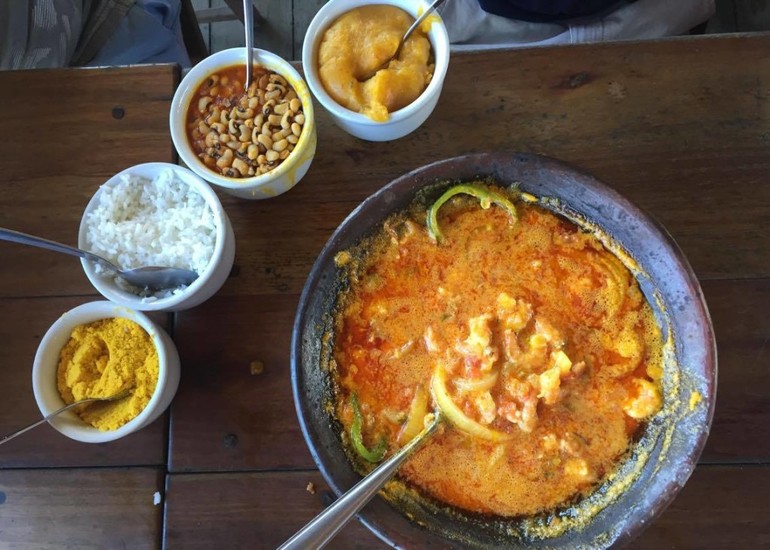I know what you’re thinking: “Food rights? I don’t remember learning about that in AP US Government class… sounds fake, but okay.” Well, you’re right — it’s not part of the United States constitution, and no, it wasn’t part of your government class curriculum.
But food rights are a real thing. So why have we never talked about this very real issue that affects people all over the world?
Let’s start with a fun fact: The Universal Declaration of Human Rights Article 25 states that “everyone has the right to a standard of living adequate for the health and well-being of himself and of his family, including food, etc.”

Gif courtesy of giphy.com
This by no means means that governments should be handing out free food on the streets— though what an amazing world that would be. It just means that if a country has the available resources, then it’s responsible for providing accessibility to food for its population.
Okay, sounds great, but let’s get one thing straight before we dive into this hot topic: while all of that sounds pretty official, it’s not actually required for a country to accept it (though it’s highly encouraged and gives the country a good rep).
Some countries are down for the cause, but other countries (like the US) are more like:

Gif courtesy of giphy.com
Fortunately, there are many countries that acknowledge food rights and directly address them in their constitutions. Here are a few countries that acknowledge food rights in some capacity.
Brazil

Photo by Josh Renaud
With one of the largest economies in the world and an awesome supply of natural resources, it’s no wonder Brazil is one of the greatest supporters of the right to food. Brazil officially recognized this right in 2010, when it was engraved into the constitution in three separate sections.
But wait, there’s more! The country was already on the fast-track to recognizing food rights even before adding it to their constitution, like when the Hunger Zero Program was created in 2003 with the goal of ending all hunger and extreme poverty in Brazil.
So… did it work? Let’s just say it needs some time and a little TLC. But overall, I’d give Brazil an “A” for effort, since they’re clearly trying with this whole “right to food” business.
Italy

Photo by Gabby Phi
If there was an award for MVP of promoting food rights, Italy would be a strong candidate to win. Though it’s not directly stated in Italy’s constitution, a few articles within it imply the right to food, and Italy has been working with the Food & Agriculture Organization for decades now to help food security in the region and around the globe.
Plus, Italy attended multiple meetings and summits where food security was the main topic, and they’ve signed on to basically everything that supports the right to food.
Just in 2009, Italy attended a meeting with other global leaders to acknowledge their partnership and efforts in achieving food security and establishing sustainable agricultural developments for vulnerable areas of the world.
To make a long story short: cheers to Italy, and cheers to the right to gelato.
Malawi

Photo courtesy of Malawitourism.com
Even though it’s a primarily poor and malnourished country, Malawi does in fact directly address the right to food multiple times within their constitution.
But then again, we have to remember that just because a country identifies the need for the right to food doesn’t mean that they are actually capable of doing so. The spread of disease and inaccessibility to natural resources are just two reasons why we still see malnourishment in a country that understands food rights.
With that being said, there are a handful of countries that do not acknowledge the right to food, and do not intend to do so anytime soon.
Botswana

Photo courtesy of Limkokwing.net
Let’s get one thing straight when we’re discussing this country: as it’s made up of 70% desert, Botswana is probably one of the least likely countries to be able to provide its citizens with food from natural resources. This means that access to water is a huge problem and the land isn’t even close to fertile.
Since growing crops clearly isn’t the way to go in this country, raising livestock has proven to be the most profitable business. But this also kind of sucks, because all of the livestock are using up the rest of the water from the Okavango Delta.
This doesn’t mean that Botswana can’t acknowledge the right to food. It’s pretty clear that, as of right now, there’s no way the country could provide its population with food, but that may not always be the case.
With a continually growing economy, Botswana could eventually see sustainability and would then be encouraged to acknowledge the right to food. I guess we’ll just have to wait and see if Botswana changes their mind about this issue.
The United States of America

Photo by Josh Renaud
The US does not accept the right to food, as our country claims that the right to food goes against the right to trade. Because of this, things such as food deserts — don’t even get me started on these — are very common around the country, leaving an incredible amount of people unable to easily gain access to groceries.
Now that I’ve fulfilled your quota of “you learn something new everyday,” I invite you to look up the status of food rights in any country, and learn more about this pressing global issue. You can check out the United Nation’s Food and Agriculture Organization’s page on The Right to Food Around the Globe for all of your burning and unanswered questions.


